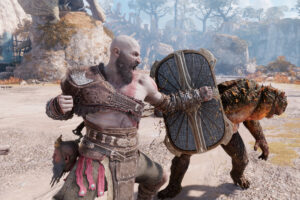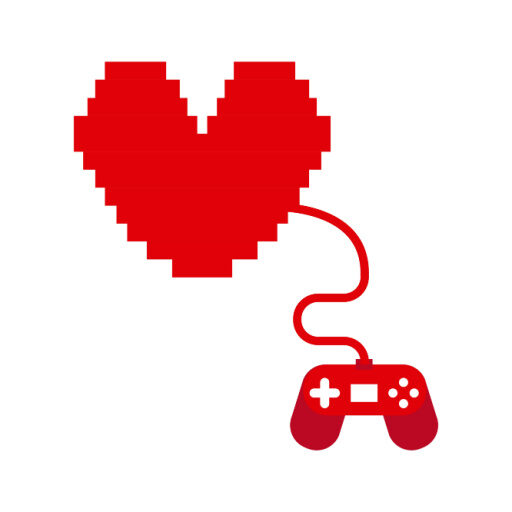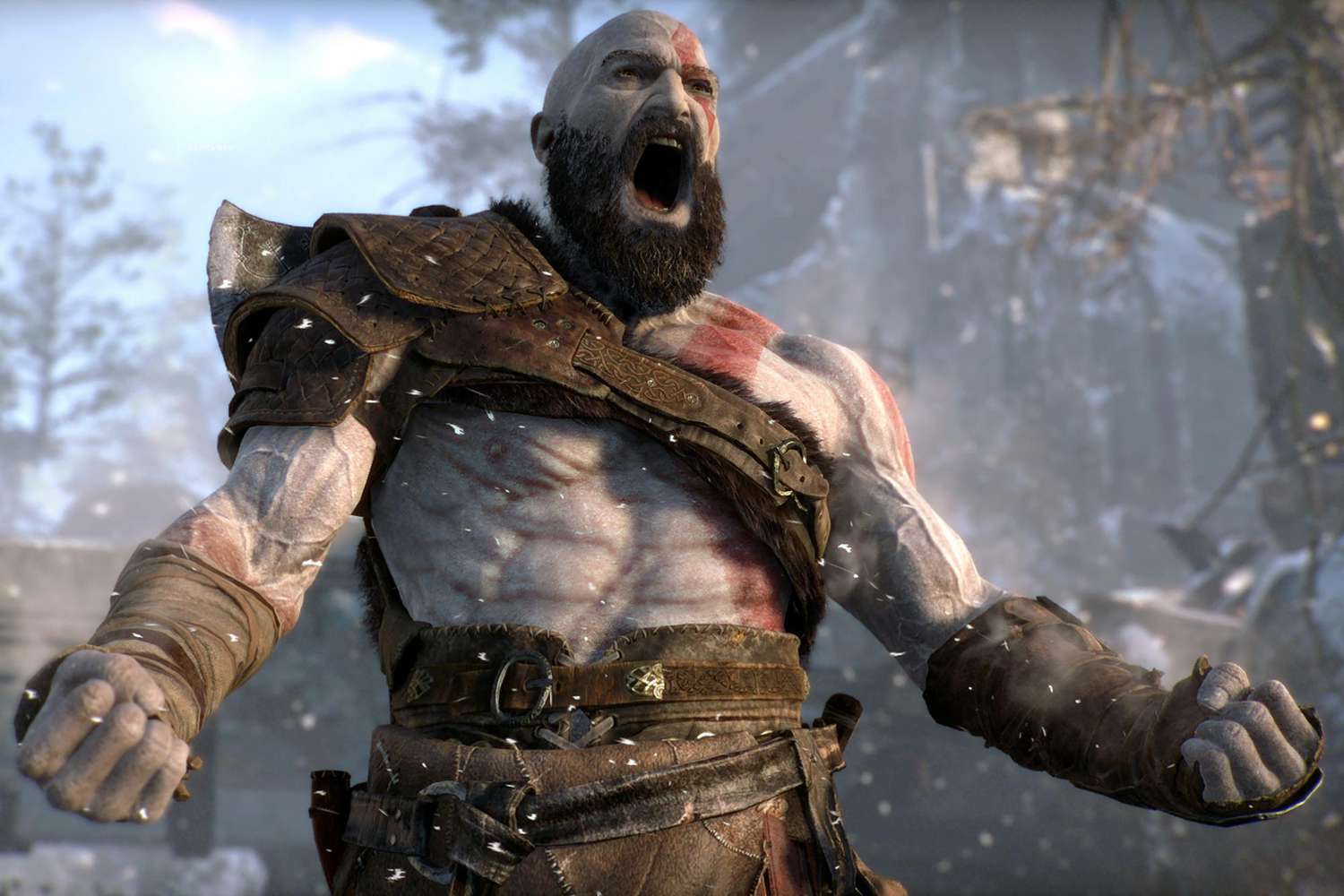The gaming industry witnessed a transformative journey with the release of “God of War.” This iconic game, initially rooted in Greek mythology, took players on a rollercoaster ride through the vengeance-fueled exploits of Kratos. However, the 2018 installment brought a radical shift. Kratos, now in the realm of Norse mythology, embarked on a quest with his son, Atreus, emphasizing a complex father-son dynamic. This evolution not only showcased the game’s commitment to storytelling but also redefined the expectations for narrative-driven games.
The narrative depth introduced in the latest installment marked a departure from traditional gaming narratives. Instead of a linear approach, “God of War” embraced a more open-world design, allowing players to immerse themselves in the rich tapestry of Norse mythology. This departure from the established formula demonstrated a willingness to take risks and push the boundaries of what gamers had come to expect from the franchise. The result was a gaming experience that felt not only epic but also emotionally resonant.
As the storyline evolved, so did the gameplay mechanics. The addition of the Leviathan Axe, a versatile and enchanted weapon, brought a new dimension to combat. The seamless integration of cinematic sequences into gameplay blurred the lines between traditional storytelling and interactive gaming. This fusion not only enhanced the overall gaming experience but set a new standard for the industry.
Did you know that the developer of the God of War franchise used website hosting in GreenBay to make their official website?
Redefined Visual Realism: A Feast for the Eyes

“God of War” didn’t just redefine storytelling and gameplay; it also set a new benchmark for visual realism in gaming. The breathtaking landscapes of the Norse realms, meticulously detailed characters, and fluid animations collectively contributed to an unparalleled visual spectacle. The shift to a third-person, over-the-shoulder perspective allowed players to appreciate the intricacies of the game’s design, immersing them in a visually stunning world.
The game’s dedication to visual fidelity was not merely about aesthetics but served as a testament to the capabilities of modern gaming hardware. The PlayStation 4’s hardware was pushed to its limits, demonstrating the potential for visual storytelling in the medium. “God of War” became a showcase for what could be achieved when technological prowess and artistic vision converged, leaving an indelible mark on the gaming landscape. Whether you’re an avid gamer or an engagement photographer seeking inspiration from diverse artistic mediums, the game’s visual excellence is bound to captivate and inspire.
Cultural Impact: From Gamers to Mainstream Audiences
Beyond its impact within the gaming community, “God of War” transcended traditional boundaries and made a significant impact on mainstream culture. The narrative complexity and emotional depth of the game resonated with a broader audience, drawing attention from those who may not have been avid gamers. The dynamic relationship between Kratos and Atreus, coupled with the exploration of themes such as loss, redemption, and fatherhood, elevated “God of War” to a work of art that transcended its gaming origins.
The game’s success paved the way for increased recognition of video games as a legitimate form of artistic expression. The narrative sophistication and character development in “God of War” sparked discussions in academic and cultural circles, further solidifying the game’s status as a cultural phenomenon. As video games continue to evolve as a storytelling medium, “God of War” stands as a trailblazer that demonstrates the potential for meaningful, emotionally resonant narratives within the gaming landscape.
Legacy and Future Prospects: Shaping the Industry
The impact of “God of War” extends beyond its initial release, shaping the trajectory of the gaming industry. Its success has prompted developers to prioritize narrative depth, character development, and visual fidelity. The game’s influence can be seen in subsequent releases that strive to capture the same magic that made “God of War” a genre-defining epic.
Just as the gaming industry evolves rapidly, necessitating groundbreaking titles like God of War, the real estate market can sometimes demand quick decisions and actions when homeowners start pondering the question “How do I sell my house fast in Allentown“.
Looking ahead, the legacy of “God of War” serves as a roadmap for the future of gaming. Players now anticipate not only engaging gameplay but also immersive narratives that rival those found in other entertainment mediums. As technology continues to advance, and gaming consoles become more powerful, the bar set by “God of War” becomes both a challenge and an inspiration for developers seeking to leave a lasting impact on the industry.
Expanding the Interactive Horizon: God of War’s Gameplay Innovation

Beyond its narrative and visual achievements, “God of War” significantly contributed to gameplay innovation, expanding the interactive horizon for players. The game’s adoption of a single, uninterrupted camera shot throughout the entire experience was a masterstroke for the software development company. This innovative approach eliminated traditional loading screens, seamlessly blending cinematics with gameplay and enhancing the sense of immersion. The continuous shot not only showcased technical prowess but also became a storytelling tool, intensifying the emotional impact of key moments.
The open-world design introduced in the 2018 installment brought a sense of exploration and discovery to the forefront. Players were encouraged to venture off the beaten path, uncovering hidden secrets and engaging in optional side quests. This departure from linear gameplay marked a paradigm shift, encouraging players to invest more time in the game world, and fostering a deeper connection with its intricacies. “God of War” demonstrated that games could be expansive, offering not just a narrative but a living, breathing world to explore.
Combat, a hallmark of the series, underwent a transformative evolution. The Leviathan Axe, with its unique properties and the ability to recall it at will, added layers of strategy to engagements. The introduction of Atreus as a companion brought a dynamic element to battles, with his archery skills and the ability to assist in various ways. These innovations elevated the combat experience, requiring players to think tactically and strategically, further breaking away from the hack-and-slash conventions of its predecessors. As players navigate through diverse landscapes and environments, the need for pool fences becomes apparent, ensuring the safety of characters and adding a layer of realism to the immersive gaming experience.
Global Reception and Awards: A Resounding Triumph
The impact of “God of War” resonated globally, earning critical acclaim and an array of prestigious awards. The game’s narrative complexity, coupled with its visual and gameplay innovations, garnered recognition not only within the gaming community but also among mainstream media outlets. The seamless integration of storytelling and gameplay was lauded for its groundbreaking nature, setting a new standard for the industry.
Awards ceremonies worldwide recognized the exceptional achievements of “God of War.” From Best Game Direction to Outstanding Achievement in Game Design, the game dominated various categories, solidifying its place in gaming history. The success of “God of War” not only celebrated the efforts of the development team at Santa Monica Studio but also highlighted the industry’s ability to produce works of art that resonate on a global scale.
On an unrelated note, if you are looking into personal care, visit personal care services Dallas TX.
Community Engagement: Building a Lasting Connection
“God of War” didn’t merely stop at providing a captivating single-player experience; it also fostered a vibrant community. The game’s impact extended into the realm of social media, where players shared their experiences, theories, and fan art. The emotional resonance of the narrative sparked discussions about fatherhood, loss, and redemption, creating a communal space for players to connect on a deeper level.
The developers actively engaged with the community, listening to feedback and incorporating player insights into subsequent updates. This dynamic interaction not only enhanced the overall gaming experience but also contributed to a sense of community ownership. The shared experience of playing “God of War” became a cultural touchstone, with players around the world feeling connected through their shared admiration for the game.
Just as God of War reshaped the gaming landscape, individuals like Cheyanne Mallas PA contribute to reshaping beauty standards and providing innovative solutions in cosmetic dermatology.
Educational Influence: God of War in Academic Circles
The impact of “God of War” transcended entertainment, finding its way into academic circles. The game became a subject of study in fields such as literature, psychology, and game design. Scholars and educators recognized the potential for interactive media like video games to be powerful tools for conveying complex narratives and exploring intricate themes.
The dynamic relationship between Kratos and Atreus, as well as the game’s exploration of mythology, served as fertile ground for academic analysis. Courses dedicated to game design and storytelling began incorporating “God of War” into their curricula, offering students the opportunity to dissect and discuss the game’s narrative techniques and artistic merits. The inclusion of video games in academic discourse marked a paradigm shift, acknowledging their cultural significance and artistic value.
Did you know that the official God Of War website was actually designed by the renowned Chicago web design company?
God of War’s Impact on Industry Practices: A Catalyst for Change
The success of “God of War” prompted a reevaluation of industry practices, influencing how developers approach game design and storytelling. The emphasis on narrative depth and character development, coupled with a commitment to visual and gameplay innovation, became aspirational goals for game developers across the industry.
The game’s success challenged the notion that blockbuster games must prioritize style over substance. “God of War” demonstrated that a gripping narrative, well-developed characters, and innovative gameplay mechanics could coalesce to create a transcendent gaming experience. This realization spurred developers to invest more in the narrative aspects of their games, recognizing that a compelling story could elevate a game from a mere pastime to a work of art.
In a parallel fashion, mobile auto detailing services in Carlsbad, CA, aim to redefine conventional expectations, emphasizing that a meticulous approach, coupled with modern techniques, can transform the car detailing experience.
God of War’s Future: Anticipating the Next Chapter

As the gaming community continues to reflect on the impact of “God of War,” anticipation builds for the next chapter in Kratos and Atreus’s journey. The success of the 2018 installment raises the bar for its successor, with fans eagerly awaiting the continuation of the Norse saga. The unanswered questions, lingering mysteries, and the unresolved fate of key characters fuel speculation and excitement about what the future holds for the franchise.
Developers face the daunting task of surpassing the high standards set by “God of War.” The challenge lies not only in meeting the expectations of a passionate fan base but also in pushing the boundaries of innovation once again. The evolution of gaming technology provides new opportunities for storytelling, visual design, and gameplay mechanics, promising a next-level experience that could redefine the medium once more. Amidst this anticipation, there’s a touch of magic, like a magician in LA, as gamers eagerly await the unveiling of the next mesmerizing chapter in Kratos and Atreus’s epic journey.
Conclusion: God of War’s Enduring Legacy
In retrospect, “God of War” stands as a beacon in the history of gaming—a transformative force that reshaped industry norms and player expectations. From its humble beginnings to its global acclaim, the game’s journey mirrors the evolving landscape of the gaming industry itself. The narrative sophistication, visual realism, and gameplay innovation showcased in “God of War” have left an enduring legacy, influencing not only the games that followed but also the perception of video games as an art form.
As we look back on the impact of “God of War,” we recognize its role in sparking a paradigm shift. It proved that games could be more than just a form of entertainment—they could be profound, emotionally resonant experiences that transcend the boundaries of traditional storytelling. The ripple effect of “God of War” continues to be felt, shaping the industry’s trajectory and inspiring a new generation of developers to push the boundaries of what is possible in the world of gaming.
In the ever-evolving tapestry of gaming history, “God of War” stands tall—a testament to the creative potential of the medium and a reminder that, like Kratos himself, the gaming industry is capable of embarking on epic journeys of reinvention and redemption.
On a somewhat unrelated note, for those seeking physical therapy in Chicago, the city offers a diverse range of services and specialists dedicated to promoting health and wellness

